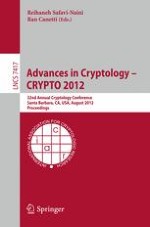2012 | OriginalPaper | Buchkapitel
Group Signatures with Almost-for-Free Revocation
verfasst von : Benoît Libert, Thomas Peters, Moti Yung
Erschienen in: Advances in Cryptology – CRYPTO 2012
Verlag: Springer Berlin Heidelberg
Aktivieren Sie unsere intelligente Suche, um passende Fachinhalte oder Patente zu finden.
Wählen Sie Textabschnitte aus um mit Künstlicher Intelligenz passenden Patente zu finden. powered by
Markieren Sie Textabschnitte, um KI-gestützt weitere passende Inhalte zu finden. powered by
Group signatures are a central cryptographic primitive where users can anonymously and accountably sign messages in the name of a group they belong to. Several efficient constructions with security proofs in the standard model (
i.e.
, without the random oracle idealization) appeared in the recent years. However, like standard PKIs, group signatures need an efficient revocation system to be practical. Despite years of research, membership revocation remains a non-trivial problem: many existing solutions do not scale well due to either high overhead or constraining operational requirements (like the need for all users to update their keys after each revocation). Only recently, Libert, Peters and Yung (Eurocrypt’12) suggested a new scalable revocation method, based on the Naor-Naor-Lotspiech (NNL) broadcast encryption framework, that interacts nicely with techniques for building group signatures in the standard model. While promising, their mechanism introduces important storage requirements at group members. Namely, membership certificates, which used to have constant size in existing standard model constructions, now have polylog size in the maximal cardinality of the group (NNL, after all, is a tree-based technique and such dependency is naturally expected). In this paper we show how to obtain private keys of
constant
size. To this end, we introduce a new technique to leverage the NNL subset cover framework in the context of group signatures but, perhaps surprisingly, without logarithmic relationship between the size of private keys and the group cardinality. Namely, we provide a way for users to efficiently prove their membership of one of the generic subsets in the NNL subset cover framework. This technique makes our revocable group signatures competitive with ordinary group signatures (
i.e.
, without revocation) in the standard model. Moreover, unrevoked members (as in PKIs) still do not need to update their keys at each revocation.
